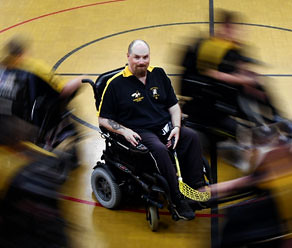I am somewhat of a gamer. I am not by any means an avid gamer or someone you should call up with questions. If you want a review of how easy a game is to play or how not confusing your controls are, I am your girl*.
I am mostly a computer gamer. I like my World of Warcraft just fine, thank-you. It has a lot of room for critique, and I have some letter writing campaigns to Blizzard in progress. But I like it. I have no love for Warhammer Online, having never played it after being promised by multiple reliable sources that I would be able to play it on my Mac, and after purchasing the Special Edition in order to get into the Beta, was most unpleasantly surprised. Whatthefuckever, I turned that store credit into a Wii Fit, something I actually used. And, no, I don’t care that you can now get it for Mac, they already shat in my Cinnamon Life. I am digressing when I just wanted to say that I prefer computer over console because I tend to find console controls too confusing for me — all the button combinations are too much to keep track of. I like to set up my buttons in a row and get my “Pew Pew Moar” on. If it is more complicated than original Nintendo’s Super Mario Bros., I don’t really enjoy it. I just don’t have the reaction times or memory to figure out all of those buttons (and I don’t need an evo psych lecture on how girls just don’t have those skills, because I have many gamer skills that translate well into the PvP aspects of WoW…I just don’t have it for console gaming).
One thing that endeared me to WoW, however, is that all the dialogue is subtitled. I am not deaf, but I do sometimes have trouble sorting dialogue out from ambient noise, both in game and out. I don’t want to have to miss something in an otherwise mostly enjoyable game because I can’t understand what the NPCs are saying. It doesn’t matter how high you turn the volume, you just can’t get everything. WoW even lets me know when someone is yelling.
Back to console games…
One console game that I did pick up was Ubisoft’s Assassin’s Creed. There was a lot of excitement over this game, it was anxiously awaited — one of the most anticipated games of the year of its release. There was also a huge deal surrounding one of its lead developers that I will leave you to read up on, — I just am too tired to rehash it — I was thrilled that it didn’t stop Jade Raymond from being a part of ASII’s team (no transcript at the link). Just for a fun exercise, Google “Jade Raymond + Assassin’s Creed II” and see how many search results come up with anything that has to do with how good she is at being a video game developer or producer, and then tell me why more women don’t go into that industry. The team at Ubisoft put in the beginning of the game that it was developed by a team of multi-cultural and religiously sensitive people from many diverse backgrounds. I found the game fantastic. The Guy beat it in just a couple of days (he eats games for breakfast like that), even if the ending did make him want to put it in the freezer, and even though I have only recently tried it, I have really enjoyed it. To me, the controls are really simple, the game play is methodical (note: things that really piss some gamers off appeal to me, as in part of my OC nature really likes the repetitive storyline, and the different things to complete. I *love* that, because it allows me to zone out, clearing my mind.), and the game itself is Really Fucking Beautiful. I love going to all the checkpoints and using the “eagle vision”, just viewing the cities.
One aspect that was missing from this design team, it seems, was someone who had input on accessibility, because one complaint I had, even before I was invested in disability activism to the degree I am now, is that it had no subtitles. Like I said, I often miss dialogue during cut scenes, and even if that does not affect my game play, it affects my gaming experience.
When Assassin’s Creed II came out I read in The Guys Game Informer that they made a lot of changes based on what fans wrote to Ubisoft asking for. Before I was willing to get this for The Guy for X-mas this year, I needed to see two things: 1) That the playable character could not drown in a two fucking inches of water, and 2) subtitles. Well what do you know, this iteration’s assassin can fucking swim, and Assassin’s Creed II includes subtitles for all of the game play.
Rawk.
We have it, and it both translates the Italian and has decent subtitles, although it doesn’t describe non-spoken sounds.
There’s more.
Ubisoft, apparently has made a commitment that they will always include the considerations of deaf and hard-of-hearing gamers in the development phases of their gaming creation. This is exciting news for me, coming from a company that I have come to really like. By like, I mean, has made the first non-Nintendo based console game that I can actually play (this is also because I find the new black controller included w/ the X-Box Elite military appreciation smaller than the original, and fits comfortably in my hands, even on a moderate pain day).
I am looking forward to finishing Assassin’s Creed so that I can move on to ASII, if for no other reason than for the subtitles. I wish they had made this pledge long ago. It is worth noting that I read on a gamer message board somewhere (I can’t find it now) that someone had written them, and they responded, saying they took that complaint very seriously, and now, here they have. This has raised Ubisoft in my mind.
Like it was hard to do at this point.
*I do sometimes call myself girl. I don’t have a problem with this.
More articles on subtitles in video games: Subtitles: Increasing Game Accessibility, Comprehension (Gamasutra)
 This is our weekly Chatterday! open thread. Use this open thread to talk amongst yourselves: feel free to share a link, have a vent, or spread some joy.
This is our weekly Chatterday! open thread. Use this open thread to talk amongst yourselves: feel free to share a link, have a vent, or spread some joy. 

